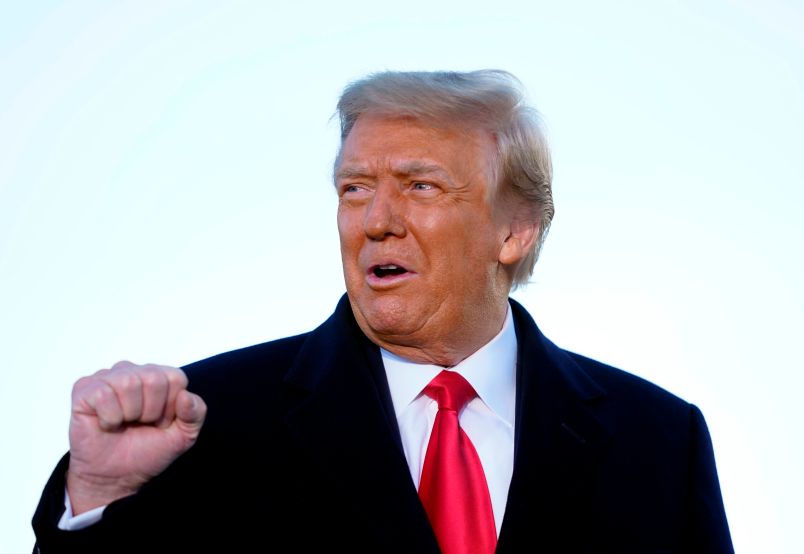On the eve of his second impeachment trial, former President Donald Trump’s lawyers argued that his speech on the day a mob attacked the Capitol simply could not have played a role inciting the violent riot against Congress.
Trump’s defense was laid out in a 75-page pre-trial brief that responded to the arguments from the House managers in a brief of their own last week.
The Trump brief leaned into the constitutional question of whether the Senate can convict a government officer no longer in office, which is where Senate Republicans have signaled they would like to keep their reasoning for acquitting Trump. However Trump’s lawyers also rebutted the impeachment article on the merits, by insisting that Trump’s speech that day did not invoke violence and that he did not in fact drag his feet in responding to the Capitol breach.
Trump’s lawyers cited right-wing outlets that traffic in conspiracy theories and claimed that Democrats had also used the kind of rhetoric that Trump employed in the lead-up to the riot. They also focused on the riot itself, arguing that revelations about alleged rioters had in fact helped Trump’s case.
For example, the former President’s attorneys noted reports that law enforcement agencies had warned of potential violence in Washington, D.C. ahead of the attack itself.
“House leadership simply cannot have it both ways,” the Trump lawyers wrote. “Either the President incited the riots, like the Article claims, or the riots were pre-planned by a small group of criminals who deserve punishment to the fullest extent of the law.”
Impeachment managers may argue both points: that Trump’s speech incited violence, but also that he had promoted the Jan. 6 rally for weeks, and that supporters of his who allegedly planned their violence ahead of time were responding to his call. Multitudes of Trump supporters charged in the Capitol riot have told authorities they were simply responding to Trump’s orders.
Later in their brief, Trump’s lawyers pointed out that Ellipse Park, where Trump gave his speech, is around a half-hour walk away from the White House. The lawyers citied the fringe website Gateway Pundit, which noted that rioters breached the Capitol grounds before Trump ended his speech.
That timeline alone demonstrated “conclusively” that Trump did not inspire the riots, the lawyers wrote, ignoring video — cited in the House impeachment managers’ brief last week — showing the crowd responding enthusiastically and aggressively to Trump’s remarks.
The defense of Trump’s actions seemed to invite a discussion of whether additional evidence could prove Trump’s knowledge of potential violence committed on his behalf. Senate Republicans have been trying to circumvent such a discussion by focusing on whether the Constitution allows the conviction of a former president already out of office. But Trump’s lawyers asserted that the House managers also lacked the evidence to back the merits of their claims.
For example, House impeachment managers noted in their brief last week that Sen. Ben Sasse’s (R-NE) claimed White House aides told him Trump was “delighted” by the attack. Seemingly in response, Trump’s lawyers argued against even the possibility of proving Trump’s mental state.
“There is no legitimate proof, nor can there ever be, that President Trump was ‘delighted’ by the events at the Capitol,” they wrote. “He, like the rest of the country, was horrified at the violence.”
In a section claiming that the impeachment trial itself was unconstitutional (a point refuted by even prominent conservative lawyers) Trump’s lawyers added a veiled threat of the precedent Trump’s trial would set.
“[A] future House could impeach former Vice President Biden for his obstruction of justice in setting up the Russia hoax circa 2016,” they wrote.
“While he could not be removed from the Vice Presidency because his term ended in 2017, he could be barred from holding future office. The same flawed logic the House Managers advance could apply to former Secretary of State Clinton for her violations of 18 U.S.C § 793.”
Read the Trump lawyers’ brief below:
Kate Riga contributed reporting.



